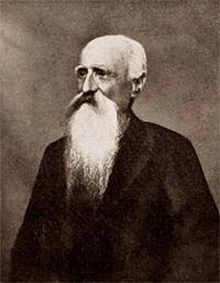Roberto Ardigò
Roberto Ardigò (born January 28, 1828 in Casteldidone (province of Cremona), † September 15, 1920 in Mantua ) was a leading philosopher of Italian positivism , educator and professor of the history of philosophy in Padua .
Life
Ardigò was initially a priest in Mantua and oriented himself to Neoplatonic ideas before his positivist positioning . In 1869 he indexed a script and he himself was suspended. He rejected the papal infallibility dogmatized in 1870 and gave up a career in the church in 1871 for reasons of conviction in order to participate in the scientific enlightenment of Italy after the unification of the nation states. Ardigò first worked as a philosophy teacher at the grammar school in Mantua, then from 1881 to 1909 as a professor in Padua.
He worked on epistemological, ethical, social-philosophical and legal positivist topics. In addition, he was the first Italian scientist who, under the influence of Comte , devoted himself to sociology from 1886. Here empiricism and, in contrast to Comte, psychology played a prominent role. The work of Ardigò contributed to the establishment of this science in Italy. The school of thought he founded also took part in the disputes about the autonomy of legal philosophy and sociology.
Works
- La psicologia come scienza positiva . (1870, then in Opere filosofiche , Vol. 1, 1st edition 1882, 3rd edition 1929) - full text on Wikisource
- Discorso sulla difesa dalla inondazione , Mantova, Stabilimento tipografico Mondovì, 1874.
- La morale dei positivisti . (1879, then in Opere filosofiche , Vol. 3, 1st edition 1885, 4th edition 1908)
- La sociologia . (in Opere filosofiche , Vol. 4, 1st edition 1886, 3rd edition 1908)
- Il Vero . (1891, 3rd edition 1913)
- La scienza della educazione . (1893, 4th edition 1916, reprint 1925).
- La Ragione . (in Opere filosofiche , Vol. 6, 1st edition 1894, 2nd edition 1906)
- L'unità della coscienza . (1898, 2nd edition 1912)
- Opere filosofiche . (1882–1918) 11 volumes.
- Scritti vari , ed. by Giovanni Marchesini. (1921) - Full text on Wikisource
- La relatività del pensiero. Saggio storico-critico (Opera postuma) . (1928)
- Lettere edite ed inedite , ed. by W. Büttemeyer . (1990-2000) 2 volumes.
literature
- F. Amerio: Ardigò . Rome 1957
- Alessandro Bortone: Ardigò, Roberto. In: Alberto M. Ghisalberti (Ed.): Dizionario Biografico degli Italiani (DBI). Volume 4: Arconati-Bacaredda. Istituto della Enciclopedia Italiana, Rome 1962.
- Wilhelm Büttemeyer : The epistemological positivism of Roberto Ardigòs . Meisenheim / Glan 1974
- Wilhelm Büttemeyer: Roberto Ardigò. In: Biographisch-Bibliographisches Kirchenlexikon (BBKL). Volume 20, Bautz, Nordhausen 2002, ISBN 3-88309-091-3 , Sp. 42-46.
Web links
- Literature by and about Roberto Ardigò in the catalog of the German National Library
Individual evidence
- ^ Pietro Pomponazzi , Mantova 1869.
- ↑ The above based on Büttemeyer 2002.
- ^ Morris R. Cohen: Italian Contribution to the Philosophy of Law in Harvard Law Review, Vol. 59. No. 4, April 1946 pp. 577-589, pp. 582.
- ^ Robert Michels , Mildred Hartsough: The Status of Sociology in Italy in Social Forces, Volume 9. No. 1, October 1930, pp. 20-39, p. 22.
- ^ Renato Treves: Sociología y Filosofia Social en el Pensamiento Italiano Contemporáneo in Revista Maxicana de Sociología, Volume 3. No. 1, pp. 5-23, p. 7.
| personal data | |
|---|---|
| SURNAME | Ardigò, Roberto |
| ALTERNATIVE NAMES | Ardigọ̀, Roberto |
| BRIEF DESCRIPTION | Italian philosopher |
| DATE OF BIRTH | January 28, 1828 |
| PLACE OF BIRTH | Casteldidone |
| DATE OF DEATH | September 15, 1920 |
| Place of death | Mantua |



